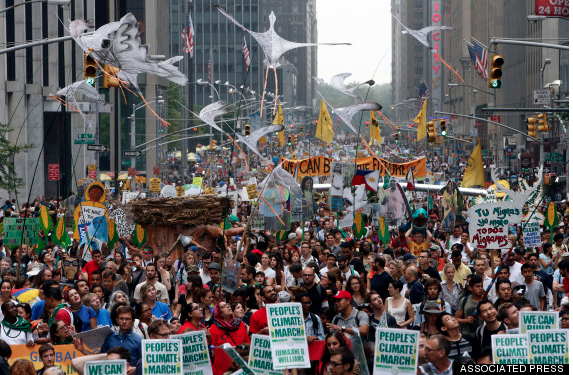Although the climate change march in New York City failed to top the news, it was much bigger than organizers’ ambitions for the march three months earlier. The next day saw a follow up demonstration called Flood Wall Street. With the fossil fuel industry as its main target, activism is warming up. Another spark was Naomi Klein’s newest book, This Changes Everything, which resonated with environmental readers, if not financial ones.
Klein is an established critic of the unfairness of corporate globalization. This Changes Everything also establishes her as a critic of corporations desecrating the environment. As a journalist, Klein documents her points well. One point stands out: Corporations must abandon their doctrine of ever increasing profits before they can do something very, very different. Deep down, executives may not believe their own messages denying environmental degradation, but unable to imagine their displacement in a new social order, collapse of the existing system terrifies them.
Top corporate managers are not the only fearful ones. Consumptive capitalism is our system. We know how to function within it.
Consequently, socially responsible business minds try to reconcile environmental action with commercial motives. Cases for environmental reform “sell” based on cost saving, profits, and job creation – business criteria. By transactional business logic, all other criteria of success are secondary. Business leaders support environmental reforms so long as they do not inhibit profitability or market competitiveness, and a flurry of corporate environmental initiatives came out during climate week. However, they fear upending established business models lest they incur financial collapse long before environmental collapse.
Despite knowing many changes we need to make, this new world is hard to imagine. Our first thought is that we will regress to a world as we think it was 50 to 500 years ago. Another impulse is that technology will resolve the crisis, almost as if we could increase biological diversity by having apps for it. And an illusion is that making a few substitutions will allow rapid economic growth to continue much as now.
The darkest possibility is from H.P. Lovecraft, as interpreted in the Archdruid Report, Sept. 17: humans live in placid islands of ignorance in the black seas of infinity, unable to comprehend the whole. If they did, fright would drive humans into the peace and safety of a new dark age. Like all earlier empires, our overstretched global economy, unable to maintain its accumulation of structures and technologies, will collapse in decentralized chaos. To escape it, most people will gladly accept a new feudalism, happy to serve a warlord defending them from all the other warlords.
Consensus is building that regardless of policy, the physical and social changes necessary will be grass roots, neighborhood-by-neighborhood, area-by-area. There all factors merge – ecological, social, and technical – so citizens may be able to fathom their unique systems as a whole. Among others, Klein proposes local action. So does the Compression Institute. An assumption is that communities of real people can learn how to deal with complex common issues, working out their own countermeasures. And they must do this faster than ever before, thereby avoiding the “Lovecraft reversion.”
For learning purposes, a community can be defined as all the people dependent on a common process. For sharing a common landscape and garden, this may be a small neighborhood. If water supply and quality is the issue, the community should cover a common watershed or aquifer, either of which may cover thousands of square miles.
A big-time shift toward community-centered development implies big-time shifts in business models for many companies. Instead of developing one-size-fits-all products and services, many companies will need to determine how to help communities develop their own solutions. That is, how can they engage with communities that are making themselves resilient in a low-resource world? Not even Naomi Klein is proposing that big government bureaucracies can provide magic solutions that big corporations can’t. It’s rather that localities have to visualize and implement solutions of their own devising.
The implications of such a shift on business thinking run deep, so deep that Stephen Colbert in an interview ragged Naomi Klein about wanting to “destroy capitalism” in order to save the planet. Actually the idea is more like going from learned dependency on hierarchical “corporatocracy” to full stakeholder participation. And promoting neighborhood collective learning clashes with the forces in a transactional society that tend to fractionate communities. Many of us do not know who lives two doors away. Working long hours far from where we live leaves little time to engage in local projects.
Our future depends at least as much on social capital as on the monetary kind, but measurements of wealth don’t recognize social capital.

